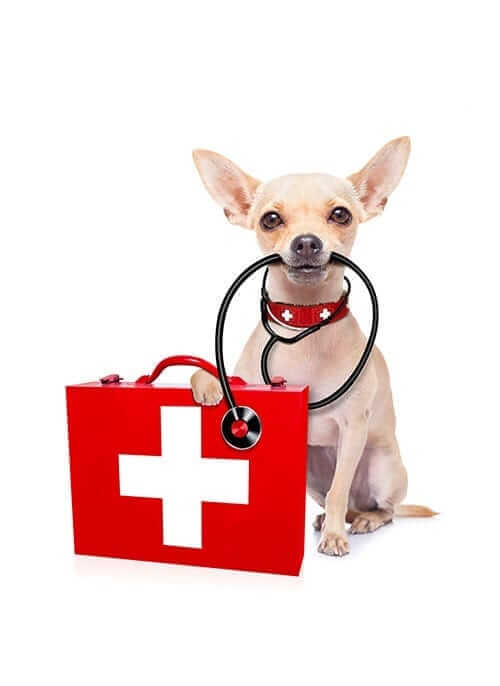Let’s hear it for summertime! Whether it is a hike along the river, a weekend camping or a long road trip, many of us get out and about with our pets in the summer more than the rest of the year. With diabetic pets, you may need to tote along a few extra supplies so you can continue your testing, but with all pets it is a good idea to have a small pet first aid kit on your outdoorsy adventures.
No one knows your pet like you do. Of course you will tailor your kit with your pet’s known issues in mind. If you are the type to seize the weekend in a big way, take your list into your vet’s office as your vet may be able to get you an anti-inflammatory or bandage material and such. Your vet can help you with your kit and guide you with dosages.
Please take your cell phone and your vet’s phone number, poison control’s phone number and the phone number for the closest ER clinic. ASPCA has a 24 hour poison control helpline. There is a $65 fee, but you will have access to speak with veterinarians and veterinary toxicologists. They are open 365 days a year at (888) 426-4435.
- Benadryl is given for allergic reactions and should be included in your pet first aid kit whenever you are off the beaten path. Allergic reactions in pets typically present as hives or facial swelling. Sometimes allergic reactions may include vomiting and diarrhea. Rarely, allergic reactions may present as anaphylactic shock which would necessitate immediate veterinary care.
- Hydrodgen peroxide can be used for vomit induction. Be sure to pack an oral syringe to administer it. Of course you would never induce vomiting for anything caustic or sharp, but if your sweetie helps himself to your chocolate stash for the s’mores you’ve prepared, you may need to induce vomiting. For some items, administering activated charcoal by mouth may be warranted. You can speak with your vet or poison control to guide you.
- Blankets will keep your injured pet warm and can double as a stretcher. If you live up north you might consider a thermal blanket. Even during the summer the nights can get cold.
- Bandage materials to carry on camping trips include medical white tape, roll cotton, roll gauze, gauze squares, telfa pads and vet wrap. Don’t forget bandage scissors and some washcloths or paper towels.
- Hydrocortisone cream can be applied to minor scrapes and abrasions to decrease the inflammation and itch.
- Antibiotic ointment can be applied to wounds.
Kaopectate is handy for diarrhea. If your sweetie is prone to loose stool or stress diarrhea, you might also consider starting a probiotic beforehand. Speak with your veterinarian. Be proactive before your camping or outdoor adventure!
- Tweezers can help remove splinters.
- Saline eye flush can be used to flush sand or dust from your pet’s eyes. This can also be used to flush wounds. Q-tips may also help get debris out of your pet’s conjunctiva. Your vet may be willing to provide antiseptic betadine packets or solution for wounds on the body.
- Antiseptic towelettes can be used to wash your hands when a sink isn’t available. Using latex gloves can avoid contaminating wounds with your grimy paws.
- Anti-inflammatory drugs such as rimadyl, deramaxx or metacam can be used if your pet has a sprain or a strain. Of course, these are prescription items that you will need to get from your vet. Caution should be used with aspirin as it is more likely to cause GI upset than the anti-inflammatories made specifically for pets. Never give Tylenol or ibuprofen to your pets. There is a very narrow toxic to therapeutic range for dogs, and both are highly toxic to cats.
- Extra food and water in case you can’t transport your injured pet. If your rootin’ tootin’ outdoors dog is a diabetic, you should bring some honey or karo syrup.
- A thermometer and a small pack of KY jelly or Vaseline for lubricating the thermometer can help assess if your pet is febrile.
- A muzzle may be useful if your pet is in pain and you need to transport or move your pet (if you are not using a soft cloth muzzle, you can use some of the roll gauze you packed for wound care).
- Qwik stop and a nail trimmer or file can be useful for torn nails.
- A flashlight will likely already be part of your outdoor adventure kit.
Now if you are sincerely a hard-core adventurer, you might consider more intense medical supplies. Hemostats? Skin staplers? Instant cold packs? Tournequit or ace bandage? Splints? I’ll let your own veterinarian help you with that!
NOTE: Consult your Veterinarian first to make sure my recommendations fit your special health needs.

 Kaopectate is handy for diarrhea. If your sweetie is prone to loose stool or stress diarrhea, you might also consider starting a probiotic beforehand. Speak with your veterinarian. Be proactive before your camping or outdoor adventure!
Kaopectate is handy for diarrhea. If your sweetie is prone to loose stool or stress diarrhea, you might also consider starting a probiotic beforehand. Speak with your veterinarian. Be proactive before your camping or outdoor adventure!





Leave A Comment